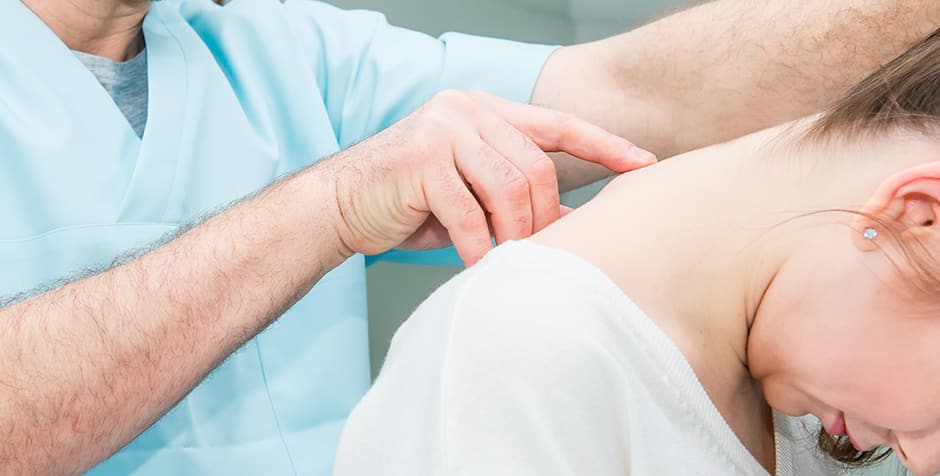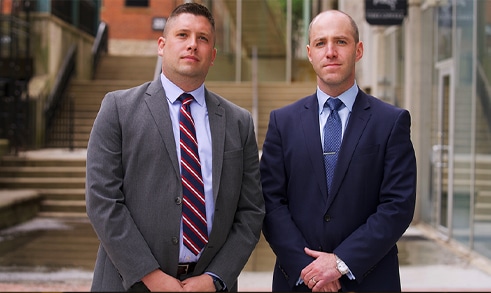
Columbus Spine Injury Lawyers
Persuasive representation for spinal cord injury victims in Ohio
Spinal cord injuries (SCIs) are often devasting injuries that change the lives of victims forever. Some SCI victims can never walk again. Many victims can never work again. Most victims live with a lifetime of pain, anxiety, and constant frustrations. Financial compensation after an accident must take into account much more than just the initial surgery and rehabilitation. Most SCI victims require a lifetime of medical care which is extremely expensive.
Preparation matters. At Soroka & Associates, LLC our trial lawyers are respected by former clients, insurance companies, and defense lawyers for our attention to detail, our network of resources, and our ability to argue your case. We work with investigators and others to determine who caused your SCI and why the defendants should be held liable. Our Columbus personal injury attorneys work with your medical team to understand the full scope of your injuries, including everything you can’t do now that you could before the accident. We have a strong record of jury verdicts and negotiated settlements in personal injury cases.
How can we help?
- What is a spinal cord injury?
- What are the symptoms and complications of an SCI?
- What causes a Columbus spinal cord injury?
- How do doctors diagnose a spinal cord injury?
- What are common Columbus SCI treatments?
- How much is my Columbus spinal cord injury worth?
- Do you have a spinal cord injury lawyer near me?

What is a spinal cord injury?
Spinal cord injuries (SCIs) occur when an event or accident causes damage to cells within the spinal cord or severs the nerve tracts. The area affected by the spinal cord injury may lose sensation. Further, these injuries may result in loss of function. It is important to seek medical attention as soon as possible after an injury to the spinal cord.
According to the prestigious Mayo Clinic, an SCI often causes permanent changes in sensations, strength, and other bodily functions. Victims often suffer physically, mentally, socially, and emotionally.
What are the symptoms and complications of an SCI?
Spinal cord injuries are generally classified as follows:
- Complete SCI, where all sensory feeling and motor function below the SCI are lost.
- Incomplete SCI, where some sensory feeling and motor function below the SCI exists.
Tetraplegia (also known as quadriplegia) means that a person’s arms, hands, trunk, legs, and pelvic organs are all affected by the SCI. Paraplegia means a person’s legs, trunk, and pelvic organ are affected.
Spinal cord injuries may cause the following conditions:
- Loss of movement
- Loss of sensation including sensitivity to touch, cold, and health
- Lack of bladder or bowel control
- Spasms and exaggerated reflexes
- Changes in sexual sensitivity, function, and fertility
- Difficulty coughing, breathing, or clearing lung secretions
- Pain or an intense stinging sensation
Swelling, fluid accumulation, bleeding, and inflammation are common secondary SCI injuries. An SCI often affects the ability of the spinal cord to communicate with your brain.
Spinal cord injury complications include bladder and bowel difficulties, UTIs, pressure injuries, lack of circulatory control, respiratory disorders, an increased risk of osteoporosis and fractures below the level of injury, loss of muscle tone, a lack of fitness and wellness, sexual health disorders, muscle pain, joint pain, and nerve pain. Many SCI victims suffer from depression and other emotional disorders.
How do doctors diagnose a spinal cord injury?
Emergency doctors and other physicians usually conduct an oral exam and a physical exam. Diagnostic tests that may be ordered include:
- X-rays, used to show if the SCI patient has any vertebral fractures, tumors, or if there are degenerative spinal changes.
- CT scans are used to identify any bone, disk, or other disorders by using computers to form cross-sectional images.
- MRIs are used to look for herniated discs, blood clots, or masses that might be causing compression of the spinal cord.
Normally, the doctors will conduct a comprehensive neurological exam when the swelling subsides, which is often a few days after the Columbus accident.
What causes a spinal cord injury?
The Mayo Clinic states that an SCI is often due to a sudden, traumatic blow that fractures the vertebrae or crushes, compresses, or dislocates the vertebrae.
Some of the types of Columbus accidents that can cause spinal cord injuries include:
- Motor vehicle accidents. These include car accidents, truck accidents, motorcycle crashes, pedestrian accidents, bicycle accidents, and Uber or Lyft accidents.
- Falls. Property owners and construction sites have a duty to regularly inspect their property and make timely repairs so that people don’t slip, trip, and fall.
- Defective products. Tools, equipment, and consumer products may be defective, meaning they may not function as they should, causing spinal cord injuries.
- Acts of violence, like assaults or gunshot wounds.
- Recreational accidents, like swimming pool or horseback riding accidents.
- Any other negligent acts that cause strong physical forces on your spine.
What are common treatments for spinal cord injuries?
Generally, there is no way to reverse spinal cord damage. The treatments for an SCI aim to restore as much function as possible and helping the victim achieve an active productive life.
Initial treatment
Initial treatments involve immobilizing the spine at the accident site – often with a rigid carrying board and neck collar. The Mayo Clinic states that early treatment focuses on helping the victim breathe, preventing shock, and avoiding complications such as cardiac difficulty, the formation of deep vein blood clots in the extremities, and urine/stool retention.
The initial care may be at an ICU, after surgery, or at a regional spine center such as the Wexner Medical Center at Ohio State University.
Rehabilitative care
According to the Wexner Medical Center, the healthcare providers who treat Columbus spinal cord injury patients include:
- Physical medicine and rehabilitation physicians or physiatrists
- Neurologists
- Neurosurgeons
- Neuropsychologists
- Certified rehabilitation nurses
- Physical therapists
- Occupational therapists
- Speech-language pathologists
- Recreational therapists
- Respiratory therapists
- Dietitians
- Social workers
- Case managers
- Rehabilitation engineers
The Wexner Medical Center provides the following therapies for SCI patients:
- Aquatic therapy, art therapy, and cognitive therapy
- Locomotor training – a type of physical therapy “where the patient is suspended in a harness over a treadmill, while specially-trained therapists move their legs to simulate walking”
- Occupational therapy which helps with daily living tasks
- Physical therapy helps patients with mobility, fitness, and strength
Other treatments include real-world simulations, speech therapy, vision therapy, and recreational therapy. Splints may be used to help lengthen muscle groups. “Botox®, nerve blockade and baclofen pump therapy, to reduce spasticity and tightness in selected muscle groups” may be options. Many patients need pain management help.
Spinal cord injury therapy generally includes treatments to strengthen muscles, redevelop fine motor skills, prevention of complications, and improve a patient’s quality of life.
The Mayo Clinic adds that modern lighter wheelchairs, computer adaptions (such as voice recognition software), electronic aids, and electronic stimulation devices may help.
It normally takes six months or longer to determine a patient’s long-term prognosis.
How much is my Columbus spinal cord injury worth?
Each person’s case is unique to them. Our Columbus trial lawyers are skilled at preparing precise demand letters to insurance carriers and arguing damage claims to juries. We seek to maximize your compensation and address your immediate and long-term needs. Our SCI lawyers demand the following damages:
- Medical bills – current and for the rest of your life
- Lost income – current and for as long as you can’t work
- Pain and suffering – all your aches, pains, worries, anxiety, and depression
- Scarring and disfigurement damages – for your physical and emotional needs
- Property damage
- Loss of consortium
We also seek punitive damages when the accident that caused your injuries was inexcusable, such as when a drunk driver struck your vehicle, or in the case of intentional harm and negligence.
Do you have a spinal cord injury lawyer near me?
The Columbus office of Soroka & Associates is located at 503 South Front Street, Suite 205. Contact us if you need directions. We can travel to your home, hospital, or rehabilitation center if you cannot travel to us.
Contact our experienced Columbus spine injury lawyers now
The personal injury attorneys at Soroka & Associates have the necessary skills, experience, and resources to provide diligent representation in spine injuries. Talk to us today to learn more about how we can help with your claim. You can call our office at 614-683-2746 or fill out our contact form. Our initial consultation is free of charge. We conduct our work in personal injury matters on a contingent fee basis. This means that we get paid only if there is a monetary award on your behalf. We serve clients in Columbus and throughout Central Ohio, including in Licking County, Delaware County, Fairfield County, and beyond.
